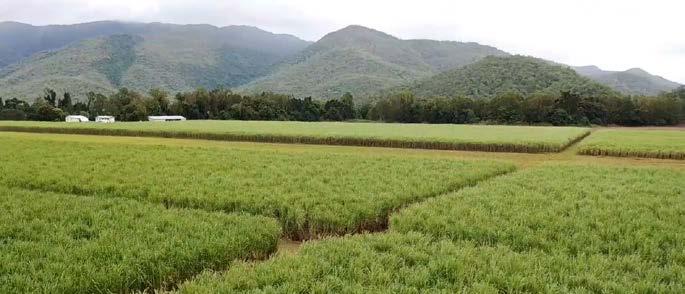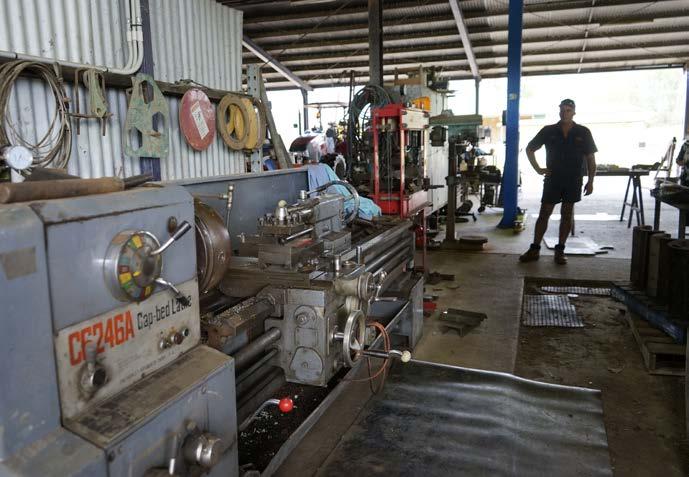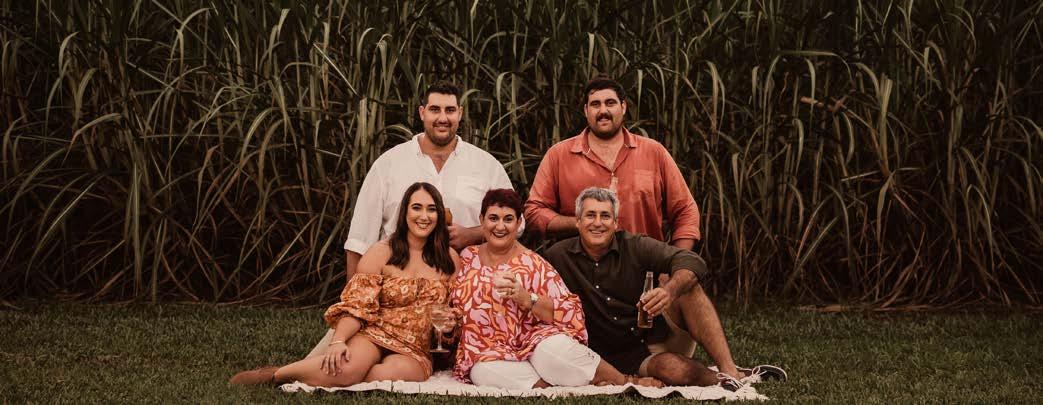
12 minute read
Family knowledge plus BMP equals sustainable farming
BY ROBYN DEVINE
Harnessing the rich tapestry of his heritage, Robert Bonassi and his wife Leanne have cultivated thriving entities, fuelled with an eagerness for knowledge and a passion for nurturing sugarcane.
With each passing year, their business entities and their families continue to flourish, reaching new heights of success.
In the outskirts of Ingham, within the idyllic Herbert River sugarcane growing district, lies the captivating farm owned by the Bonassi family.
Third generation grower, Robert lives on the same farm where he grew up and Leanne, who grew up just down the road at Helen’s Hill, have raised three children there. Robert’s father was a well-respected grower in the district who passed away two years ago, but his legacy remains strong in the Bambaroo property.
Robert explained that they strive to run a productive and well-maintained sugarcane farm as well as running an efficient harvesting business and is proud of the efforts of the whole family that work together, especially during harvesting.
“We farm on about 230 hectares in total area, and our contract harvests 115 -128 thousand tonnes of cane annually depending on the years, I only cut for myself and another grower’s harvest, but the other grower is probably the biggest single entity in the Herbert, so it keeps us pretty busy. Not only do we harvest his cane, but I also do land prep for him, and I manage one of his farms and work closely with the other manager that looks after the rest of the farms.

Leanne and Robert’s three children continue the family passion for the sugarcane industry, although not all of them work on farm full time.
Their daughter Kiara works as a Management Accountant at Incitec Pivot in Townsville, and according to Robert regularly shares interesting discussions about the industry and what’s new with fertiliser.
Robert had been harvesting for 30 years, when son Brandon, decided to work on the farm after leaving school, he also gained his boiler-making apprenticeship through Wilmar. He shares the same enthusiasm as Robert to grow and cut cane, and now drives the harvester, relieving Robert from constant driving duties.
“He's been driving for eight years now. It's family, it works well, the farmer that we cut for, he likes it because we're family and we all share the same passion,” Robert said.
“Our second son Cameron did a plumbing trade and does the season with us while off season he goes back to the plumbing industry.
“It's quite a good business and it's been good for the kids to grow up around family on the farm.
“Dad was second generation, as my grandfather farmed here first until he built in town and moved there, we had extra land then that we had cattle on, as my grandfather loved cattle, because that is what he had in Italy and my grandfather would travel up and down to town to tend the cattle until he was nearly 90 years old, when he decided to slow down. As our farming enterprise got bigger, we gobbled up our cattle country. Now cane and harvesting are what we do.
“We embraced modern technology farming years and years ago. There was a group of us, that went on young farmer trips which were supported by CANEGROWERS and other industries which allowed us to travel around Queensland and the northern rivers region, looking at different ways people farm, and we adopted a lot of things.
“I've been on 1.8 rows mounded now for 8-9 years, maybe longer. I was lucky enough that Dad allowed me to do it, he could see what I wanted to do. In some cases, adopting the change from the old farming ways to new farming practices was quite challenging. It can be like that still today with a lot of areas just not ready to embrace it.
“I'm a big believer in legume crops, not as in sales of legumes seeds just yet, but I do a rotation crop every year. Normally we'll plant legumes, but 2023 – 2024 has been challenging with a wet year. I'm interested in soil health and growing good legume crops to put the nutrient back into the soil.

Robert recognises that there are challenges with the reducing number of contracting and labour resources available in the district over the years, however he’s open to finding solutions to counter these issues as they arise, for example two years ago he extended their machinery portfolio with a billet planter. He also has decided to employ an extra farm worker, to take on those jobs that help maintain a healthy farm business.
Robert has used a smart farming application called Aglantis, designed by a company based in the Burdekin, to link together all the GPS devices on the vehicles on farm. The system ensures the mapping system is regularly being updated, in an efficient and effective manner. Robert believes in working smarter and not harder.
“Once they become available, our mapping will get updated every year because you're always moving something, a line somewhere. We were the first in the Herbert that they've mapped and then they give me a hard copy mapping of all our farms. We are in the process of plotting all our power poles, and as we do supplementary irrigation, we have a lot of hydrants throughout the farm, that they too will be plotted. They do an overlay that will alarm us when you're coming up close to any of these.

“They're great to have because like power lines, when the guys are harvesting and they're doing 1012 hours a day, there’s always that possibility that something can happen, it’ll help if you've got an alarm that's going to alert you that power poles are coming up. It's another really good tool to have in the toolbox.”
Robert has a thirst for knowledge and is open minded to learning about techniques to assist his farming practices.
“Over the years I've been part of the Catalyst Grower Group, which is a group of growers throughout eastern Queensland that share good ideas and I've been a part of that for nine to ten years now. It's good to get together once a year and share ideas and they're a good group of growers that will actually steer you in the right direction if they've tried something and you're thinking of trying it.”
It has helped Robert stay ahead of the game in relation to the Reef regulations and he has been included in the Grower Incentive Grants that are facilitated with the support of CANEGROWERS Herbert River, assisting in much welcomed machinery and farm implements.
“We have embraced a lot of the new technology and farming methods, these days it's getting harder and harder to get people to come and do any contract work for you, the more you can do yourself, the better,” Robert said.
“I never did an apprenticeship, but one thing Leanne and I wanted for our children, was that they were to have an apprenticeship in case they need something to fall back on. Farming is never great all the time, so it’s good to have a trade if there's a downtime. Up until three years ago Brandon was going back to the mill, but now in the slack we do so much fabrication, we don't like to buy implements, in most cases we make them.”
Brandon and Robert enjoy the ability to fabricate custom-made solutions to the unique challenges that arise on their farms.
Robert does all his own record keeping and is Smartcane BMP accredited after embracing the program early.
“Leanne has always worked in town, she said right from the start that ‘BMP’s gonna be your baby’,” Robert joked.
“I could see Smartcane BMP was going to be a necessity moving forward because there’s always going to be government regulations, so we need to be at the forefront of all of it. And keeping records is a big part of that, for future management plans.
“I currently still do a paper trail, but we are looking to getting it on the laptop soon, which would probably be a bit easier, especially the way we've set up our GPS on the farm I can just transfer that straight to the computer.
“We went through our second accreditation in 2023, which went without a hassle. For example, I have had chemical storage for probably eight years. It was quite easy to transition, it’s just a matter of taking the time to write it down every day. You write down what you did, your fertilising, your spray records, you write it down as you do it and it's not a problem.
Leanne said Robert had a good role model in his father, observing what he practised when growing cane, she said he’d always kept detailed records of his husbandry.
“Dad always wrote in a little notebook, and it wasn't until he passed away and we were going through all the cupboards that we found them. Everything had a date, with how many bags an acre, that sort of thing,” Robert agreed.
“I think with record keeping it’s important to be up to date, moving forward, it’s only going to get tougher. If you've done it in the past, it's water off a duck’s back.
“I think people thought Smartcane BMP was going to be the big bad wolf, and they were very shy of it, that record keeping was going to control them. And it does control you to a certain degree, but as long as you're doing things right then you get to understand your ameliorants and soil samples. I won't do my nutrient management plan though; I'd rather give it to someone that's qualified in that field.
“The last couple of years now we've been hit with cane grubs and many of the pest management products are coming off the market, which is very scary for us. If we lose that there may be parts of the farm where I am not going to be able to grow cane, I'm hoping that the research that Sugar Research Australia is working on, a new approach, will work.
“We know that where we are putting mill mud and ash, we're finding now we're getting grubs and the confidor insecticides are not controlling it, we have to rethink our management and by keeping lots of years of records we can go back and look at what we did years ago. You always do the wondering. I wonder if we did that like that again would that work or is this way better?
“Varieties are different to what we had years ago, and conditions are always changing so what worked last year will not necessarily work this year. You're always doing something different or something new.
“Smartcane BMP made me open my eyes to the practices that happened in the past and we have to do it better and leave things better for our kids moving forward.”
Robert and Leanne see one of the biggest challenges for the industry is workers and how to introduce new workers into the industry.
“We've had these two guys working for us for quite a long time, but they both needed a break two years ago, so we had to find two new workers and that was a challenge,” Leanne said.
“Luckily after a year off, they decided they did want to come back, we do look after our people, I think knowledge and experience is just second to none.
“That group of guys spend more time together than their own family during those six months of the season. You’ve got to have a good work environment.
“And you have to pay them the right tonne rate to cover the hours they're in paddock or they're not going to want to come back.”

Robert admitted that he wasn’t completely sure what was the best way to deal with future labour shortages as an industry.
“I don't know how we're going to deal with it, like whether its migrants coming in, more females picking up haulout driving, I’m not sure what the answer is Robert said.
“It’s going to be frustrating to start, some pick it up quite well, and some just cannot pick it up, because it's just not about driving a tractor. There's a lot of responsibility there, you know there’s servicing and there's all sorts of things that go with it.
“As employers, they're under our care basically from when they leave home to when they get home. And you want him to get home the way they left home, that's part of the reason we opt to buy JCBs. They're smooth, they’re like driving your car, if we can take that pressure off them that’s good. You don't hear about back pain, and you don't hear them complain about rough headlands. We spend the extra money to try to get things as easy and comfortable for them, to get a good day's work out of them. That's how we see it and I think they appreciate this, that’s why they're coming back.”
“You've got to manage fatigue as an employer. We basically tell the boys whenever they feel like they need to have a day off give us notification and we will work with them. Give them that extra day off, even if it’s at the end of a RDO. They come back so much better, and at the end of the day, it’s their wage that they're going to lose out on, but they’re often so much better for it.
“You got to make them feel wanted,” Robert said.






